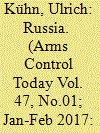| Srl | Item |
| 1 |
ID:
166868


|
|
|
|
|
| Summary/Abstract |
The end of the 1987 Intermediate-range Nuclear Forces (INF) Treaty has the potential to plunge Europe and NATO into deep crisis. Russia’s continued violation coupled with the Donald J. Trump administration’s desire to balance against Moscow and Beijing could force a new missile debate on Europeans. Even though Washington is trying to assuage its allies, the specter of another round of INF missile deployments to Europe is not unrealistic. Meanwhile, NATO’s European members face a dilemma. Some want NATO to resolutely push back against Russia. Others want to avoid a new deployment debate, at almost all costs. The Kremlin will use these cleavages to weaken NATO. If not carefully handled, NATO’s response to the Russian missile buildup could lead to domestic turmoil in a number of European states and render the alliance ineffective for a prolonged period. Europeans need to act now and voice their preferences in the military and diplomatic domains. A number of different military options are available, below the level of deploying new INF missiles in Europe. However, Europeans need to consider trade-offs regarding crisis and arms-race stability. At the same time, it will be up to European capitals to conceptualize a new arms-control framework for the post-INF world, one that takes into account today’s geopolitical realities and the entanglement of modern conventional and nuclear forces. Given the Trump administration’s loathing of arms control, concepts of mutual restraint may well have to wait for the next US administration. In any case, that should not stop Europeans from taking on more responsibility for their own security.
|
|
|
|
|
|
|
|
|
|
|
|
|
|
|
|
| 2 |
ID:
174483


|
|
|
|
|
| Summary/Abstract |
In May 2020, a debate erupted in Germany on the future of NATO nuclear sharing and Berlin’s participation in the arrangement that has seen U.S. nuclear weapons deployed in European nations for decades. This may well turn out to be an opportunity for the alliance, European security, and arms control. Even though it might not sound very realistic today, within the next five years the United States could withdraw the tactical weapons it deploys in Europe with no negative consequences for NATO unity and the security of Europe. In order to secure such an outcome, German leaders and NATO policymakers will have to combine reassurance and arms control in novel and smart ways.
|
|
|
|
|
|
|
|
|
|
|
|
|
|
|
|
| 3 |
ID:
156272


|
|
|
| 4 |
ID:
150321


|
|
|
|
|
| Summary/Abstract |
The incoming Trump administration inherits a U.S.-Russian relationship marked by disagreement and confrontation in the wake of Russia’s annexation of Crimea, the wars in Syria and Ukraine, the West’s use of economic sanctions, and reciprocal complaints about interferences in domestic affairs.
|
|
|
|
|
|
|
|
|
|
|
|
|
|
|
|